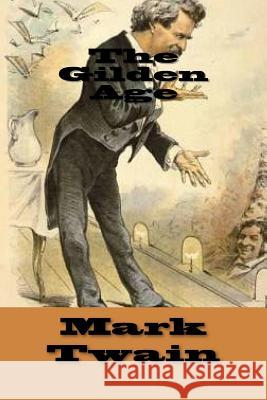The Gilden Age » książka
The Gilden Age
ISBN-13: 9781540806444 / Angielski / Miękka / 2016 / 574 str.
Plot summary The term gilded age, commonly given to the era, comes from the title of this book. Twain and Warner got the name from Shakespeare's King John (1595): "To gild refined gold, to paint the lily... is wasteful and ridiculous excess." citation needed] Gilding gold, which would be to put gold on top of gold, is excessive and wasteful, characteristics of the age Twain and Warner wrote about in their novel. Another interpretation of the title, of course, is the contrast between an ideal "Golden Age," and a less worthy "Gilded Age," as gilding is only a thin layer of gold over baser metal, so the title now takes on a pejorative meaning as to the novel's time, events and people. The novel concerns the efforts of a poor rural Tennessee family to become affluent by selling the 75,000 acres (300km2) of unimproved land acquired by their patriarch, Silas "Si" Hawkins, in a timely manner. After several adventures in Tennessee, the family fails to sell the land and Si Hawkins dies. The rest of the Hawkins story line focuses on their beautiful adopted daughter, Laura. In the early 1870s, she travels to Washington, D.C. to become a lobbyist. With a senator's help, she enters Society and attempts to persuade Congressmen to require the federal government to purchase the land. A parallel story written by Warner concerns two young upperclass men, Philip Sterling and Henry Brierly, who seek their fortunes in land in a novel way. They make a journey with a group intent on surveying land in Tennessee in order to acquire it for speculation. Philip is good-natured but plodding. He is in love with Ruth Bolton, an aspiring physician and feminist. Henry is a born salesman, charming but superficial. The theme of the novel is that the lust for getting rich through land speculation pervades society, illustrated by the Hawkinses as well as Ruth's well-educated father, who nevertheless cannot resist becoming enmeshed in self-evidently dubious money-making schemes. The Hawkins sections were written by Twain; these include several humorous sketches. Examples are the steamboat race that leads to a wreck (Chapter IV) and Laura's toying with a clerk in a Washington bookstore (Chapter XXXVI). Notable too is the comic presence throughout the book of the eternally optimistic and eternally broke Micawber-like character, Colonel Beriah Sellers. The character was named Escol Sellers in the first edition and changed to Beriah when an actual George Escol Sellers of Philadelphia objected. A real Beriah Sellers then also turned up, causing Twain to use the name Mulberry Sellers in The American Claimant. The Sellers character was modeled after Twain's maternal cousin, James Lampton, and the land-purchase plot parallels Twain's father's purchase of a Tennessee parcel whose prospective sale, Twain wrote in his autobiography, "kept us hoping and hoping, during 40 years, and forsook us at last." The main action of the story takes place in Washington, D.C., and satirizes the greed and corruption of the governing class. Twain also satirizes the social pretensions of the newly rich. Laura's Washington visitors include "Mrs. Patrique Oreille (pronounced O-rey)," the wife of "a wealthy Frenchman from Cork." The book does not touch upon other themes now associated with the "Gilded Age," such as industrialization, monopolies, and the corruption of urban political machines. This may be because this book was written at the very beginning of the period."
Zawartość książki może nie spełniać oczekiwań – reklamacje nie obejmują treści, która mogła nie być redakcyjnie ani merytorycznie opracowana.











